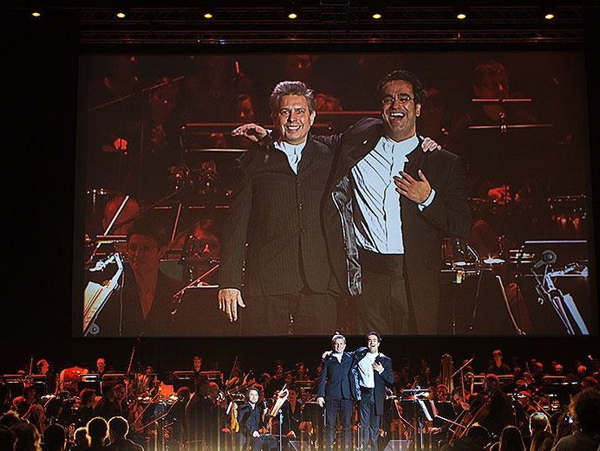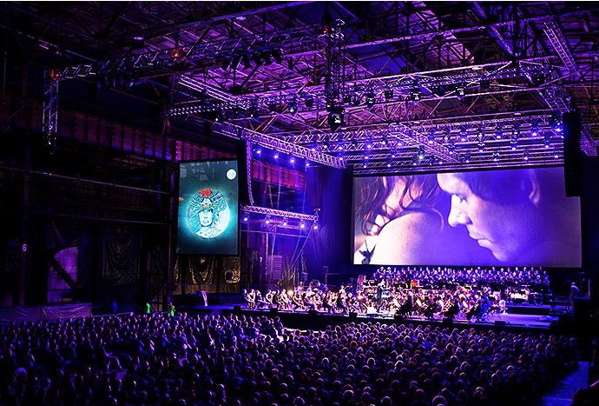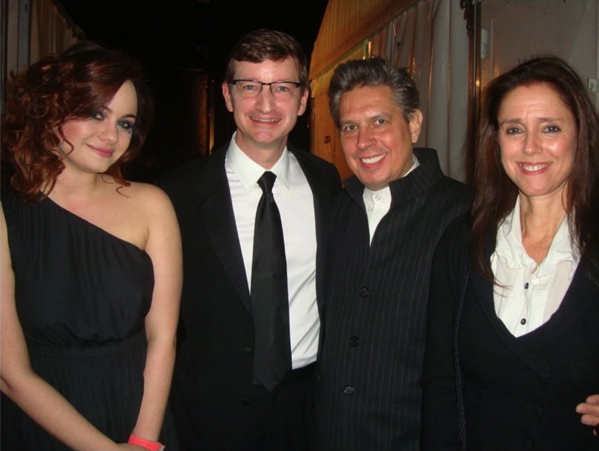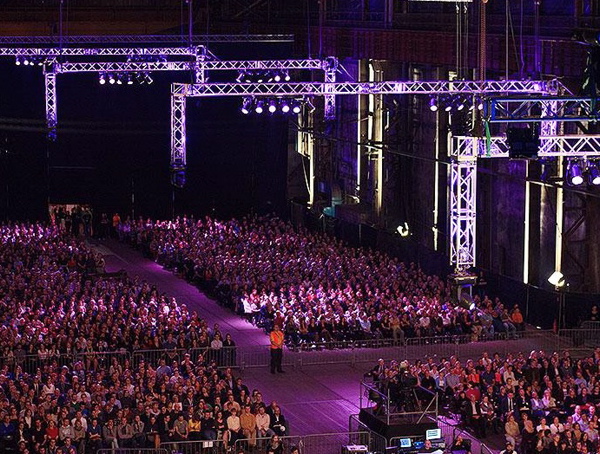
Composer Elliot Goldenthal and conductor Diego Navarro in concert at the Krakow Film Music Festival
By Ray Bennett
KRAKOW, Poland – Julie Taymor talks about meeting Paul McCartney and Yoko Ono when she made “Across The Universe”, which is filled with Beatles music. Taymor and McCartney alone sit next to each other in a screening room. “It’s quiet, and then I hear him singing along to one his songs, and I knew it would be all right,” Taymor says.
She meets John Lennon’s widow – “and her lawyer” – at her home in the Dakota Building. Taymor and partner Elliot Goldenthal have decided that Lennon’s song that goes “I want you, I want you so bad … “ will be perfect for a scene in which the lead character answers Uncle Sam’s demand that he must be drafted during the Vietnam War. Ono stares at Taymor: “You know he wrote that about me.”
Still, they got the movie made with the songs they wanted although the director says she will not listen to the soundtrack CD because of the edits and changes that were made. She says she loves what Goldenthal – and fellow music producers T-Bone Burnett and Teese Gohl – did with the arrangements for the film’s stars and assorted guest artists.
Goldenthal speaks of the “chromosomes” in a Beatles song: “If you try to duplicate their sound and you get one chromosome wrong, it’s a disaster, so you must go another way.”
They spoke at a 90-minute Q&A session on the Art of Collaboration that I moderated at the Krakow Film Music Festival in Poland. Artistic Director Robert Piaskowski invited them along with other filmmakers and composers for the annual three-day event staged first in 2008.

Tom Tykwer’s ‘Perfume: The Story Of A Murderer” accompanied by full orchestra and chorus in Krakow
Along with screenings, panel sessions and parties, there were three extraordinary concerts held in the vast Nowa Huta Steelworks, two of which I attended. Audience members had to negotiate the industrial area’s gates and then ride buses more than two miles to the vast central hall of an enormous building once called the Vladimir Lenin Steelworks, which remains a functioning factory known as the Tinning Plant of Arcelor Mittal Poland. For the festival, it was converted to a concert hall with 4,000 seats, a stage big enough for full orchestra and chorus, and a giant movie screen. What the venue lost in acoustics, it more than made up for in atmosphere.
On May 24, German filmmaker Tom Tykwer and fellow composer Reinhold Heil were on hand for a screening of Tykwer’s 2006 period drama “Perfume: The Story Of A Murderer”. The film screened in its entirety accompanied by the Sinfonia Cracovia conducted by Ludwig Wicki with two choirs and soprano Karolina Gorgol-Zaborniak.
Tykwer and Heil said it was the first time they had heard the complete score (which also featured music by Johnny Klimek) with orchestra and chorus combined. Budget restrictions meant that for the film the two parts were recorded separately.
The tale of a cruelly mistreated orphan who grows up to be a uniquely gifted but murderous creator of perfumes stars Ben Whishaw in the lead with Dustin Hoffman, Alan Rickman and Rachel Hurd-Wood. Some of the English dialogue was lost amidst the live music (although not to the local audience due to Polish sub-titles) but the picture is strange and engrossing and the live orchestral performance added to its epic moments.
The closing concert at the same venue featured excerpts from Jerry Goldsmith’s score for “Alien” (1979), James Horner’s for “Aliens (1986); Goldenthal’s for “Alien3” (1992), and John Frizzell’s for “Alien Resurrection” (1997) in a suite called the Biomechanical Symphony. With clips from the films and Sinfonia Cracovia conductor Diego Navarro’s fiery command of the baton, the music was dynamic and haunting, and made me reach for Twentieth Century Fox’s splendid Blu-ray “Alien Anthology” as soon as I got home.

Elliot Goldenthal and Julie Taymor, right, with Krakow radio personality Magdalena Miska-Jackowska and Varése Saraband’s Robert Townson, who presented the Goldenthal concert
The second part of the evening featured suites that Goldenthal had prepared of music from his films “Titus” (1999), “Frida” (2002) and “The Tempest” (2010) with Taymor, “Interview With The Vampire: The Vampire Chronicles” (1994) with frequent collaborator Neil Jordan, and “Batman Forever” (1995) with Joel Schumacher.
Composer and director winced when the mix jinxed phrases in the “Frida” score but they joined the general applause for Polish soloist Joanna Slowinska’s passionate delivery of Goldenthal’s Latin songs from the film and the contribution of Mexican players Ernesto Anaya, Pancho Navarro and Camilo Nu. Maestro Navarro threw himself into each piece and Goldenthal’s extraordinarily vivid score for “Titus” resounded around the vast walls of the steelworks.
The Krakow Film Music Festival is linked with the annual Tenerife International Film Music Festival in July in the Canary Islands where native-born Navarro is festival director. Along with Jan A.P. Kaczmarek’s Transatlantyk Poznan International Film and Music Festival in Poland in August and the World Soundtrack Awards at the Ghent Film Festival in Belgium in October, they have become major and much-valued events in the world of film music.

Krakow 2012 concert audience inside the former Lenin Steelworks [Photos courtesy of Krakow Film Music Festival

Krakow festival puts some steel into film music
Composer Elliot Goldenthal and conductor Diego Navarro in concert at the Krakow Film Music Festival
By Ray Bennett
KRAKOW, Poland – Julie Taymor talks about meeting Paul McCartney and Yoko Ono when she made “Across The Universe”, which is filled with Beatles music. Taymor and McCartney alone sit next to each other in a screening room. “It’s quiet, and then I hear him singing along to one his songs, and I knew it would be all right,” Taymor says.
She meets John Lennon’s widow – “and her lawyer” – at her home in the Dakota Building. Taymor and partner Elliot Goldenthal have decided that Lennon’s song that goes “I want you, I want you so bad … “ will be perfect for a scene in which the lead character answers Uncle Sam’s demand that he must be drafted during the Vietnam War. Ono stares at Taymor: “You know he wrote that about me.”
Still, they got the movie made with the songs they wanted although the director says she will not listen to the soundtrack CD because of the edits and changes that were made. She says she loves what Goldenthal – and fellow music producers T-Bone Burnett and Teese Gohl – did with the arrangements for the film’s stars and assorted guest artists.
Goldenthal speaks of the “chromosomes” in a Beatles song: “If you try to duplicate their sound and you get one chromosome wrong, it’s a disaster, so you must go another way.”
They spoke at a 90-minute Q&A session on the Art of Collaboration that I moderated at the Krakow Film Music Festival in Poland. Artistic Director Robert Piaskowski invited them along with other filmmakers and composers for the annual three-day event staged first in 2008.
Tom Tykwer’s ‘Perfume: The Story Of A Murderer” accompanied by full orchestra and chorus in Krakow
Along with screenings, panel sessions and parties, there were three extraordinary concerts held in the vast Nowa Huta Steelworks, two of which I attended. Audience members had to negotiate the industrial area’s gates and then ride buses more than two miles to the vast central hall of an enormous building once called the Vladimir Lenin Steelworks, which remains a functioning factory known as the Tinning Plant of Arcelor Mittal Poland. For the festival, it was converted to a concert hall with 4,000 seats, a stage big enough for full orchestra and chorus, and a giant movie screen. What the venue lost in acoustics, it more than made up for in atmosphere.
On May 24, German filmmaker Tom Tykwer and fellow composer Reinhold Heil were on hand for a screening of Tykwer’s 2006 period drama “Perfume: The Story Of A Murderer”. The film screened in its entirety accompanied by the Sinfonia Cracovia conducted by Ludwig Wicki with two choirs and soprano Karolina Gorgol-Zaborniak.
Tykwer and Heil said it was the first time they had heard the complete score (which also featured music by Johnny Klimek) with orchestra and chorus combined. Budget restrictions meant that for the film the two parts were recorded separately.
The tale of a cruelly mistreated orphan who grows up to be a uniquely gifted but murderous creator of perfumes stars Ben Whishaw in the lead with Dustin Hoffman, Alan Rickman and Rachel Hurd-Wood. Some of the English dialogue was lost amidst the live music (although not to the local audience due to Polish sub-titles) but the picture is strange and engrossing and the live orchestral performance added to its epic moments.
The closing concert at the same venue featured excerpts from Jerry Goldsmith’s score for “Alien” (1979), James Horner’s for “Aliens (1986); Goldenthal’s for “Alien3” (1992), and John Frizzell’s for “Alien Resurrection” (1997) in a suite called the Biomechanical Symphony. With clips from the films and Sinfonia Cracovia conductor Diego Navarro’s fiery command of the baton, the music was dynamic and haunting, and made me reach for Twentieth Century Fox’s splendid Blu-ray “Alien Anthology” as soon as I got home.
Elliot Goldenthal and Julie Taymor, right, with Krakow radio personality Magdalena Miska-Jackowska and Varése Saraband’s Robert Townson, who presented the Goldenthal concert
The second part of the evening featured suites that Goldenthal had prepared of music from his films “Titus” (1999), “Frida” (2002) and “The Tempest” (2010) with Taymor, “Interview With The Vampire: The Vampire Chronicles” (1994) with frequent collaborator Neil Jordan, and “Batman Forever” (1995) with Joel Schumacher.
Composer and director winced when the mix jinxed phrases in the “Frida” score but they joined the general applause for Polish soloist Joanna Slowinska’s passionate delivery of Goldenthal’s Latin songs from the film and the contribution of Mexican players Ernesto Anaya, Pancho Navarro and Camilo Nu. Maestro Navarro threw himself into each piece and Goldenthal’s extraordinarily vivid score for “Titus” resounded around the vast walls of the steelworks.
The Krakow Film Music Festival is linked with the annual Tenerife International Film Music Festival in July in the Canary Islands where native-born Navarro is festival director. Along with Jan A.P. Kaczmarek’s Transatlantyk Poznan International Film and Music Festival in Poland in August and the World Soundtrack Awards at the Ghent Film Festival in Belgium in October, they have become major and much-valued events in the world of film music.
Krakow 2012 concert audience inside the former Lenin Steelworks [Photos courtesy of Krakow Film Music Festival